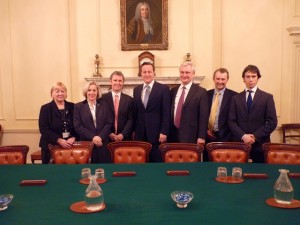Discussing rural communities at No.10
In his role as Treasurer of the All-Party Parliamentary Group (APPG) on Rural Services – Rory was one of the leaders of a cross-party coalition, which yesterday pushed the Prime Minister for a fairer deal for rural communities. The group had requested and been granted a private meeting with the Prime-Minister at 10 Downing Street. Rory was joined by Parliamentary colleagues Graham Stuart (Conservative), Tessa Munt (Liberal Democrats), Simon Hart (Conservative), Pat Glass (Labour) and Nigel Evans (Conservative), representing a variety of rural constituencies, from Cumbria to Yorkshire’s Ribble Valley, the West Country and Wales. They told the Prime Minister that rural areas were being consistently disadvantaged across the UK.
The Prime Minister was told that rural areas receive less funding per capita, have fewer services, and pay higher taxes. The cross-party group also discussed the need for funding for rural fire services, schools and colleges, and transport. The Prime Minister said that he was very keen to work with the group on looking for innovative solutions to rural problems – and focused particularly on the benefits of sharing facilities. The Prime Minister said he took a particular interest because he himself represents the second-most sparsely populated constituency in the south-east – of 400 square miles. He asked the group to suggest more measures which could support rural areas over the coming months.
Rory said: “I pushed the Prime Minister on three issues: on looking at revising the sparsity formula, when allocating funding; on the need to get rid of needless requirements and egulations, which are obstacles to the successful running of local services; and on the very worrying issue of charity procurement processes, where too often small, local charities are subsumed by larger national bodies. I was delighted that he also paid special tribute to our broadband initiatives in Cumbria, which are so crucial to improving the infrastructure that we need to flourish as a rural community.”
The meeting with the Prime Minister was the first step in a cross-party campaign for a fairer deal for rural areas. Rory has also championed Cumbria’s potential to be one of six national ‘Rural Growth Network’ pilots, on the same day that stakeholders met at Newton Rigg college to discuss the format of the county-wide bid.
Rory said: “There is no doubt in my mind that Cumbria is perfectly suited to be a Rural Growth Network. I think we can make great use of our existing networks – such as the Farmer Network, and the Rural Women’s Network – and build on them, thinking of innovative ways to bring enterprise support and education direct to communities. This might take the form of using village halls as training hubs, or looking at ways to make rural apprenticeships more suited to our youth, and I have no doubt that we will put together a really strong bid to make Cumbria a pioneer in rural enterprise.”
It is thought that the pilot Regional Growth Networks – which will operate in rural areas that were considered inappropriate for Enterprise Zones – will consist of a number of relatively small ‘enterprise hubs’ on underused business parks, or brownfield sites, and will provide essential infrastructure to existing rural businesses and start-ups. It will offer particular support for women-led enterprises, and aims to overcome barriers of lack of access, infrastructure and business support. First stage bids are to be submitted by January 21st 2012, and chose pilots are expected to be announced in March.
Picture below: Left to right: Pat Glass MP, Tessa Munt MP, Nigel Evans MP, the Prime Minister, Graham Stuart MP, Simon Hart MP, and Rory Stewart MP





